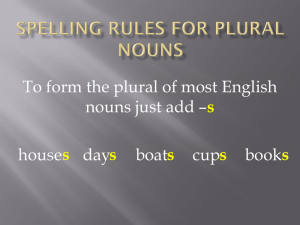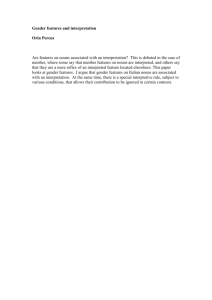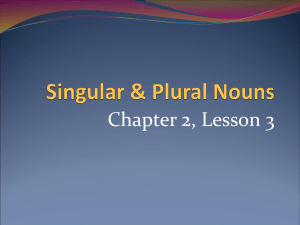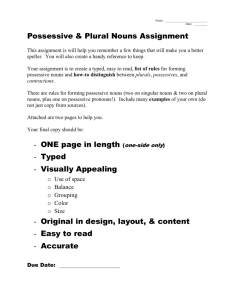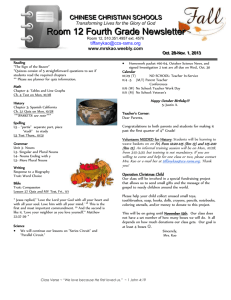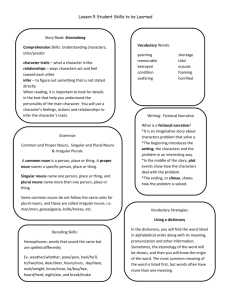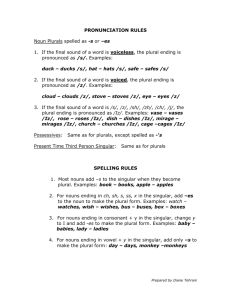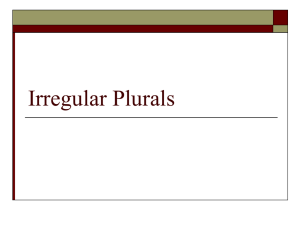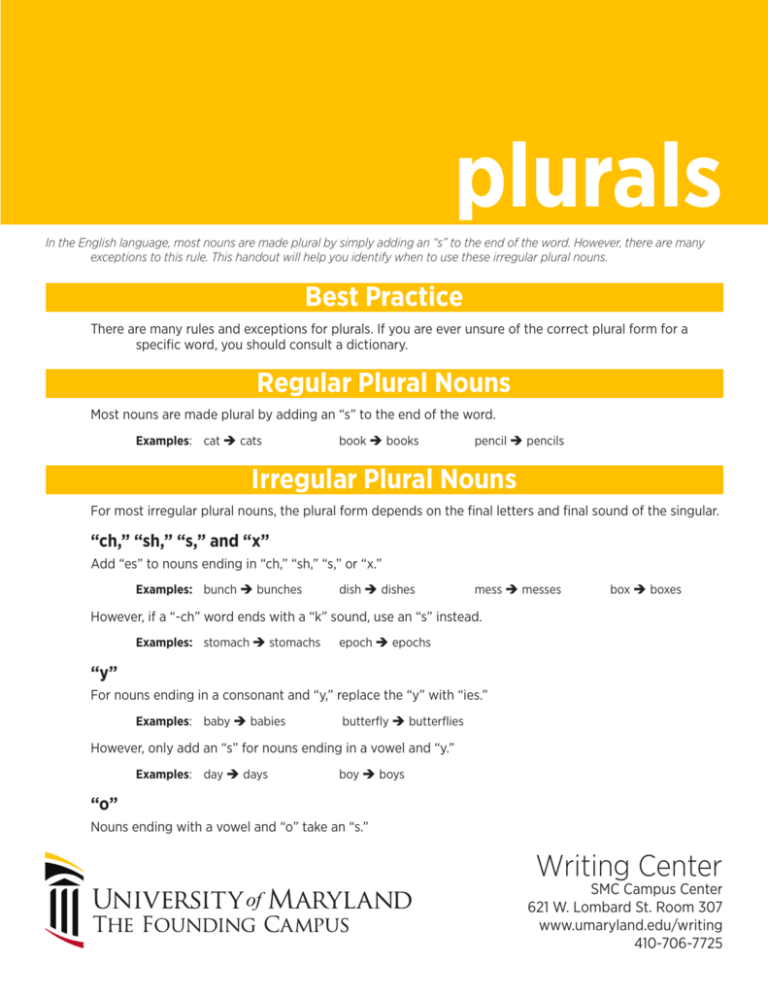
plurals
In the English language, most nouns are made plural by simply adding an “s” to the end of the word. However, there are many
exceptions to this rule. This handout will help you identify when to use these irregular plural nouns.
Best Practice
There are many rules and exceptions for plurals. If you are ever unsure of the correct plural form for a
specific word, you should consult a dictionary.
Regular Plural Nouns
Most nouns are made plural by adding an “s” to the end of the word.
Examples: cat cats
book books
pencil pencils
Irregular Plural Nouns
For most irregular plural nouns, the plural form depends on the final letters and final sound of the singular.
“ch,” “sh,” “s,” and “x”
Add “es” to nouns ending in “ch,” “sh,” “s,” or “x.”
Examples: bunch bunches
dish dishes
mess messes
box boxes
However, if a “-ch” word ends with a “k” sound, use an “s” instead.
Examples: stomach stomachs
epoch epochs
“y”
For nouns ending in a consonant and “y,” replace the “y” with “ies.”
Examples: baby babies
butterfly butterflies
However, only add an “s” for nouns ending in a vowel and “y.”
Examples: day days
boy boys
“o”
Nouns ending with a vowel and “o” take an “s.”
Writing Center
SMC Campus Center
621 W. Lombard St. Room 307
www.umaryland.edu/writing
410-706-7725
Examples: radio radios
zoo zoos
video videos
Words imported into English from Italian and Spanish take an “s.”
Examples: canto cantos
solo solos
taco tacos
Shortened version of nouns also take an “s.”
Examples: photo photos
memo memos
kilo kilos
Other nouns ending with a consonant and a vowel can take either “s” or “es.” Check a dictionary for the
preferred term.
Examples: volcano volcano, volcanoes
halo halos, haloes
buffalo buffalos, buffaloes
However, seven words must end end in “es” in their plural form: “echo,” “embargo,” “hero,” “potato,”
“tomato,” “torpedo,” and “veto.”
Examples: potato potatoes
veto vetoes
hero heroes
“f”
Nouns ending in “lf” will change their endings to “lves.”
Examples: self selves
half halves
wolf wolves
Exception: gulf gulfs
Nouns ending in “ife” will change to “ives.”
Examples: life lives
knife knives
Exceptions: strife strifes wife wives
fife fifes
Nouns ending in “eaf” will change to “eaves.”
Examples: leaf leaves
sheaf sheaves
Other nouns ending in “f,” “ff,” or “fe” will take an “s”
Examples: roof roofs
cuff cuffs
giraffe giraffes
However, some nouns ending in “f” have two plural forms. (The underlined plural is the preferred one.)
Examples: hoof hooves, hoofs
wharf wharves, wharfs
Plurals from Old English
Some nouns in Modern English still retain their Old English plural forms. Many of these words become
plural by changing their vowels instead of by adding an ending.
For nouns with “oo” in the middle, the vowel changes from “oo” to “ee.”
Examples: tooth teeth
foot feet
goose geese
For some nouns, change the vowel sound “ouse” to “ice.”
Examples: mouse mice
louse lice
Writing Center
SMC Campus Center
621 W. Lombard St. Room 307
www.umaryland.edu/writing
410-706-7725
Exception: house houses
The “a” in “man” changes to “e.” This is also true for compound words that contain “man.”
Examples: man men
woman women fireman firemen
hitman hitmen
Other Old English nouns are made plural by adding “en.”
Examples: child children
ox oxen
Plurals without Singular Forms
There are several nouns in English that do not exist in the singular form. Many of these terms are items of
clothing or tools.
Examples: pants shorts tongs pliers scissors
These words are grammatically plural.
Examples: My pants are dirty.
Singulars without Plural Forms
Non-count nouns, also known as mass nouns, cannot be quantified and lack a plural form. They usually
fall into one of the following categories: gases, liquids, metals, abstractions, languages, particles,
foods, natural phenomena, and sets of items.
Examples: oxygengarbagefurnitureEnglish
For more information, see our “Nouns” handout.
Singulars with Identical Plural Forms
For some nouns, the singular and plural forms are the same. Many of these words are animal-related.
Examples: fish fish
deer deer
sheep sheep
species species
Special Plurals
Greek and Latin Nouns
Some English nouns are borrowed from Greek or Latin; therefore, they have Greek or Latin plural forms.
Many of these words are used in scientific and technical contexts. Below are some of the most
common classes of these words.
Greek-derived nouns ending in “on” are changed to “a.”
Examples: criterion criteria
phenomenon phenomena
Greek-derived nouns ending in “ma” can be changed to “mata,” although “s” is also acceptable.
Examples: stoma stomata, or stomas
stigma stigmata, or stigmas
Latin-derived nouns ending in “a” are changed to “ae.”
Examples: alga algae
alumna alumnae
vertebra vertebrae
larva larvae
Writing Center
SMC Campus Center
621 W. Lombard St. Room 307
www.umaryland.edu/writing
410-706-7725
Latin-derived nouns ending in “us” are changed to “i.”
Examples: fungus fungi
alumnus alumni
stimulus stimuli
syllabus syllabi
Note: In some cases, English speakers do not use the Latin plural form, but instead add an “es.”
Examples: campus campuses
bonus bonuses
virus viruses
Latin-derived nouns ending in “um” are changed to “a.”
Examples: datum data medium media memorandum memoranda
Latin-derived nouns ending in “is” are changed to “es.”
Examples: thesis theses
hypothesis hypotheses
basis bases
Latin-derived nouns ending in “ix” and “ex” are changed to “ices.”
Examples: matrix matrices
vertex vertices
appendix appendices
Compound Plurals
Compound nouns usually contain one word which is more important than the other. This word is called the
head, and it normally (but not always) appears at the end of the word. This is the part of the word
that is pluralized.
Examples: football footballs
swimming pool swimming pools
not-for-profit not-for-profits
Most compounds that appear as single words place the plural on the final element of the word.
Examples: lifetime lifetimes
grandmother grandmothers
racecar racecars
For compound words that are hyphenated or separated with a space, the head is usually the first word. In
such cases, the first word should be pluralized.
Examples: brother-in-law brothers-in-law
attorney general attorneys general
However, in some cases, the head may appear last. For these words, pluralize the last word.
Examples: merry-go-round merry-go-rounds
fact-finder fact-finders
For compound words with no head, simply pluralize the final element.
Examples: fade-out fade-outs
know-it-all know-it-alls
If the first element of a compound is possessive, place the plural on only the final element.
Examples: traveler’s check traveler’s checks
finder’s fee finder’s fees
Acronyms
To pluralize acronyms and words with capital letters, add only an “s.”
Examples: ABCs
HMOs
YMCAs
JPEGs
Abbreviations
To form the plural versions of most abbreviations, add only an “s.” If the abbreviation contains a period,
place the period after the “s.”
Writing Center
SMC Campus Center
621 W. Lombard St. Room 307
www.umaryland.edu/writing
410-706-7725
Examples: Eds. (Editors)
vols. (volumes)
lbs. (pounds)
Drs. (Doctors)
Academic Degrees
Plural abbreviations of academic degrees are among the few exceptions to the rule regarding apostrophes.
To pluralize the abbreviation of an academic degree, use an apostrophe in order to prevent
confusion.
Examples: Ph.D.’s
B.A.’s
M.A.’s
Decades
When pluralizing the names of decades, add an “s” with no apostrophe.
Examples: the 1960s
the ‘90s
Letters of the Alphabet
Use an apostrophe when pluralizing lowercase letters. However, do not use an apostrophe with capital
letters unless doing so is necessary to prevent confusion. For example, use an apostrophe with the
letter grade “A” in order to avoid confusing it with the word “As.”
Examples: mind your p’s and q’s
three Cs straight A’s
References
Azar, B. S., & Hagen, S. A. (2009). Understanding and using English grammar. White Plains, NY: Pearson Longman.
English Plurals. (2013, August 19). In Wikipedia. Retrieved from http://en.wikipedia.org/wiki/English_plurals
Faigley, L. (2009). The little penguin handbook. New York, NY: Longman.
Howard, R.M. (2011). Writing matters. Boston, MA: McGraw-Hill.
Writing Center
SMC Campus Center
621 W. Lombard St. Room 307
www.umaryland.edu/writing
410-706-7725


